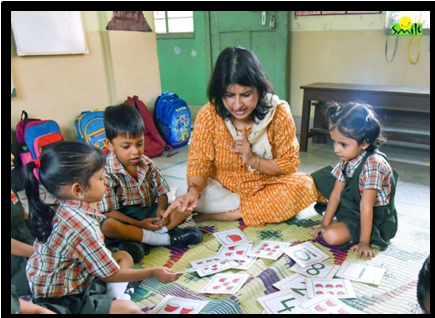THE ECONOMIC CASE FOR INVESTING IN INDIA’S CHILDREN
Syllabus:
GS 2:
- Issues relating to development and management of Social Sector/Services relating to Health, Education, Human Resources.
- Issues relating to poverty and hunger.
Focus:
- India’s focus on leveraging its demographic dividend through education and job creation.
Source:- Smile Foundation
India’s focus on leveraging its demographic dividend through education and job creation underscores the necessity for economic investment in its children. Surprisingly, early childhood education (ECCE) has been historically underfunded and overlooked, despite its critical importance.
Underinvestment in ECCE
- Historical Neglect: Early Childhood Education and Care (ECCE) has been historically underfunded, overlooked in favor of later educational stages, despite its foundational importance for long-term development and well-being.
- Perception Issues: ECCE is often trivialized as mere child’s play or deemed to be the responsibility of households, undervaluing its potential impact on societal and economic development.
- Gender Bias: The undervaluation is partly attributed to ECCE being traditionally seen as women’s work, leading to its marginalization in public policy and investment priorities.
- Lack of Government Focus: Despite recognizing the demographic dividend, Indian policy has not adequately prioritized or invested in ECCE infrastructure, quality of teaching, or accessibility, missing critical opportunities for enhancing national development.
- Inadequate Research and Data: There’s a significant gap in localized, systematic research on ECCE’s socio-economic benefits within the Indian context, hindering evidence-based policy-making and investment.
| Anganwadi
· Anganwadi is a rural child and maternal care center in India. · Launched in 1975 as part of the Integrated Child Development Services program to address child hunger and malnutrition. · Offers six services: supplementary nutrition, pre-school non-formal education, immunization, health check-ups, nutrition and health education, and referral services. · Implemented by States/UTs under a centrally sponsored scheme. · Beneficiaries identified through Aadhaar. |
Policy and Investment in ECCE in India
- Increased Budget Allocations: The Indian government has notably increased its investment in ECCE, tripling the outlay for teaching-learning materials in recent years. This reflects a growing recognition of the importance of early childhood education in the nation’s developmental agenda.
- Anganwadi System Expansion: Significant funds have been allocated to the Anganwadi system, which serves as the backbone of public ECCE provision in India. This investment aims to enhance infrastructure, improve service quality, and expand access to education and care for India’s youngest citizens.
- National Initiatives for Quality Improvement: Programs like the National Initiative for Proficiency in Reading with Understanding and Numeracy (NIPUN) Bharat and Poshan Bhi Padhai Bhi have been launched to address foundational literacy and numeracy, and to integrate nutrition with education in early childhood settings, thereby elevating the quality of ECCE.
- Focus on Human Resource Development: The government is making strides in providing Ayushman Bharat services for Anganwadi workers, Accredited Social Health Activists (ASHA), and helpers. This policy move not only aims to improve the health and well-being of the workforce but also to professionalize and strengthen the capacity of those directly involved in delivering ECCE services.
The Future of ECCE in India
- Commitment to Developmental Goals: India’s aspiration to transform into a developed nation by 2047 underscores the strategic importance of investing in early childhood care and education (ECCE) as a cornerstone for sustainable human development.
- Enhancement of ECCE Quality: Through initiatives like NIPUN Bharat and Poshan Bhi Padhai Bhi, India is actively working to elevate the quality of early childhood education, integrating essential aspects of learning with nutritional support to foster a holistic developmental environment for children.
- Targeted Focus on Early Learning: Acknowledging the critical impact of early years on lifelong learning and development, India is prioritizing interventions for children under six, aiming to bridge learning deficits and secure a strong foundation in literacy and numeracy.
- Strategic Investment in Human Capital: The emphasis on ECCE signals a shift towards viewing early childhood development as an investment in the nation’s future, aligning educational policies with broader economic and social development objectives.
The argument for increased investment in ECCE is clear—early childhood is the foundation of a human being, and by extension, the nation. India’s commitment to its future generations is reflected in its evolving policies and increasing budgetary allocations towards ECCE, marking a critical step towards realizing its developmental aspirations.
| Other Policies
· The National Policy for Children (1974) led to the initiation of Integrated Child Development Services (ICDS) in 1975, aiming for holistic child development and caregiver capability enhancement. · The National Policy on Education (1986) highlights early childhood care and education (ECCE) as vital for human development, acknowledging its integrated nature. · The National Nutrition Policy (1993) recommended interventions for early childhood care and nutrition. · The 12th Five-Year Plan prioritizes systemic reforms in ECCE across public, private, and voluntary sectors, extending beyond ICDS. · The India Newborn Action Plan (2014) aims to reduce preventable newborn deaths and stillbirths through strategic interventions across six pillars. · The National Education Policy 2020 proposes the incorporation of ECCE into the formal education system, introducing a new 5+3+3+4 structure with ECCE integrated into the Foundational Stage encompassing Pre-School and classes 1 and 2. |
Source:
Mains Practice Question:
Critically analyze the importance of early childhood education (ECCE) in India’s pursuit of achieving its demographic dividend. Discuss the current state of investment and policy focus on ECCE, highlighting the need for a strategic shift towards quality and inclusivity.




